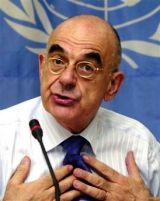UN Sudan envoy counsels against any southern secession
KHARTOUM, June 2 (AFP) — The special UN envoy to Sudan counseled against the secession of south Sudan which he said would destabilize regional and international security, the Sudanese governmental SUNA agency said Thursday.
 “If the Sudan does not remain one state, this will pose a threat to the region and to international peace and security,” said Jan Pronk at a forum held at Khartoum University on the January north-south peace accord.
“If the Sudan does not remain one state, this will pose a threat to the region and to international peace and security,” said Jan Pronk at a forum held at Khartoum University on the January north-south peace accord.
He called on the Sudanese people to make unity “an attractive option in a referendum in south Sudan by the end of the six-year transitional period” in 2011.
A key point of the deal that ended 21 years of north-south war — Africa’s longest-running conflict — is a six-year interim period of autonomy for the south after which it will hold a referendum on secession.
Pronk cited “the maintenance of peace, respect for the rights of the minorities, states and women and equality in revenue and power sharing,” as conditions favoring the preservation of a unified Sudan.
He said the UN would help the former warring parties disarm fighters, remove landmines, support development projects and provide services essential for the repatriation of some four million refugees that are starting to come back.
The international body also began deploying peacekeepers that are part of a 10,000-strong force.
The leader of south Sudan’s former rebels, John Garang, also voiced hope Wednesday that his country would stay unified.
“We have six years to make unity attractive and we’ll work together in the north, south, east and west to create a new environment, new parameters for unity so that Sudan belongs equally to all its citizens whether they are of Arab origin or African Christians, Muslims or believe in traditional African religions,” he said
The conflict pitted the mainly Christian and animist south against the Muslim and Arab-dominated central government and cost an estimated 1.5 million lives, displacing more than four million people.
